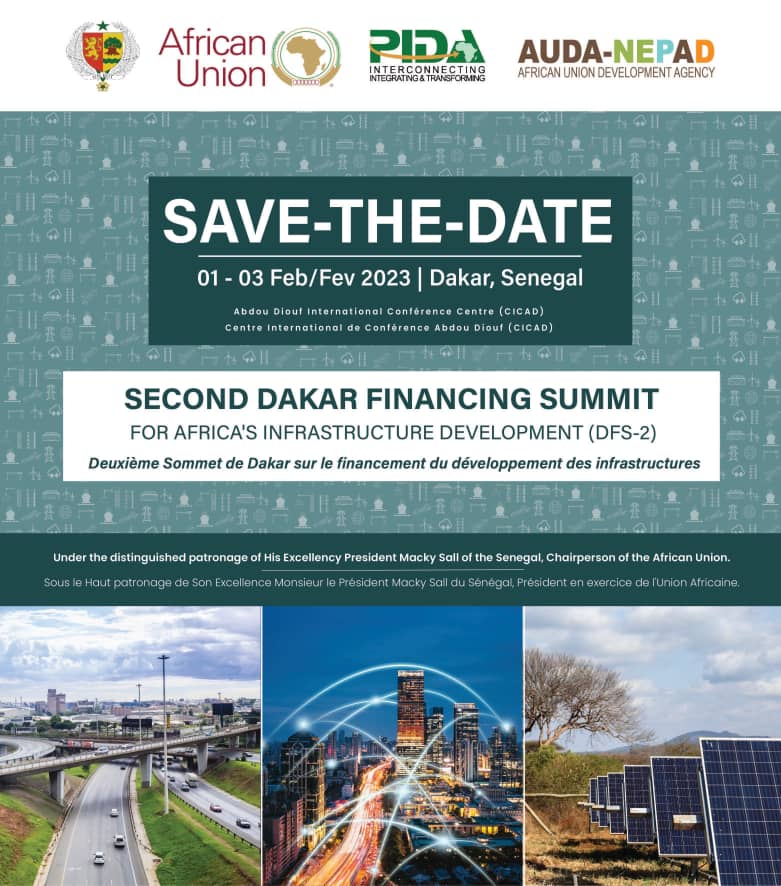|
Getting your Trinity Audio player ready…
|
By Baboloki Semele
Programme for Infrastructure Development in Africa (PIDA) stakeholders are bracing themselves for the second Dakar Financing Summit for Africa’s Infrastructure Development (DFS 2.0), which will take place from 01 – 03 February 2023, under the distinguished patronage of His Excellency President Macky Sall of Senegal, Chairperson of the African Union. The anticipated event will be held under the theme; “Keeping the momentum for continental infrastructure transformation.”
The Dakar Summit aims to mobilize key stakeholders around the efforts of the African Union and AUDA-NEPAD to accelerate the implementation of priority regional infrastructure projects. Stakeholders include African Heads of State and Governments, Business executives, Development Finance Institutions (DFIs), Private Investors, Institutional Investors, and development partner institutions.
By bringing together the highest decision-makers from the public and private sectors, the Summit will provide a space to find practical ways to improve project preparation and identify innovative financing structures involving public and private financing.
At the end of the Summit, project owners and developers will better understand how to effectively design project preparation and thus reduce the time it takes to get PIDA projects to market. At the same time, potential financiers will have addressed the issue of obstacles to the financial viability of projects and will be in direct contact with project developers and regulators.
The second summit follows a series of PIDA-related efforts, one of them being the first Dakar Summit of 2014, which birthed “The Dakar Agenda for Action (DAA)”, according to which infrastructure development remains a key driver and a critical enabler for sustainable growth in Africa, adding that the current favourable economic landscape in the continent provides a unique opportunity to collectively address the infrastructure deficit by financing critical national and regional high impacts projects.
According to the African Union Development Agency (AUDA-NEPAD), the key organiser of the Summit, addressing Africa’s infrastructure gaps will help in creating the economic pre-conditions needed for longer-term growth enshrined in the goals of the African Union and AUDA-NEPAD as well as to foster poverty alleviation.
In the upcoming summit, it is expected that participants will focus on the best means to promote enabling legal, policy and regulatory environment to enhance infrastructure project bankability and investment, as well as solutions to unblocking the challenges associated with project preparation as well as equally explore the de-risking mechanisms to advance project financing for transport and energy development, and the expansion of regional ports to promote trade competitiveness, especially in the direction Africa is taking; enhancing regional trade through continental free trade area (AfCFTA).
The Programme for Infrastructure Development in Africa (PIDA) is the basis for the implementation of priority projects to transform Africa and the inspiration for the financing of the construction of modern infrastructure based on the PIDA Priority Action Plan (PAP) projects, or better still, PIDA is the African Union’s (AU) continental infrastructure framework to address infrastructure bottlenecks through cross-border infrastructure development in the areas of Transport, Energy, Information and Communication Technology (ICT) and Water.
In February 2021, the AU Heads of State and Government adopted the Second Priority Action Plan (PIDA PAP 2), comprising 69 priority infrastructure projects to be implemented by 2030 complemented by an
implementation plan and financing strategy.
According to the PIDA Financing Strategy, the 69 PIDA PAP 2 projects represent an aggregate CAPEX of USD$ 160.8bn. The average annual infrastructure commitments required for the PIDA-PAP 2 during its implementation period 2021-2030 result in USD$ 16 bn, 60% higher than the yearly average of financing commitments secured during PIDA-PAP 1 (USD$ 10 billion over 8 years). PIDA-PAP 2 projects have been selected ensuring an equal regional distribution in the number of projects across African regions.
Nevertheless, the distribution of CAPEX costs differs significantly among regions. Whereas projects’ CAPEX costs in Western and Eastern Africa account for US$ 40.5 billion and USD$ 37.9 billion respectively, other regions such as southern and central Africa account for US$ 13.8 billion and USD$ 8.6 billion, respectively. Additionally, there are 17 multi-regional projects with an estimated cost of USD$ 43.6 billion.
Through the Dakar Financing summit, it is anticipated that PIDA stakeholders will add their voices and call on African governments to support the implementing institutions’ efforts in making this vehicle from Africa to Africa successful, by adopting concrete actions towards financing for Africa’s infrastructure development
